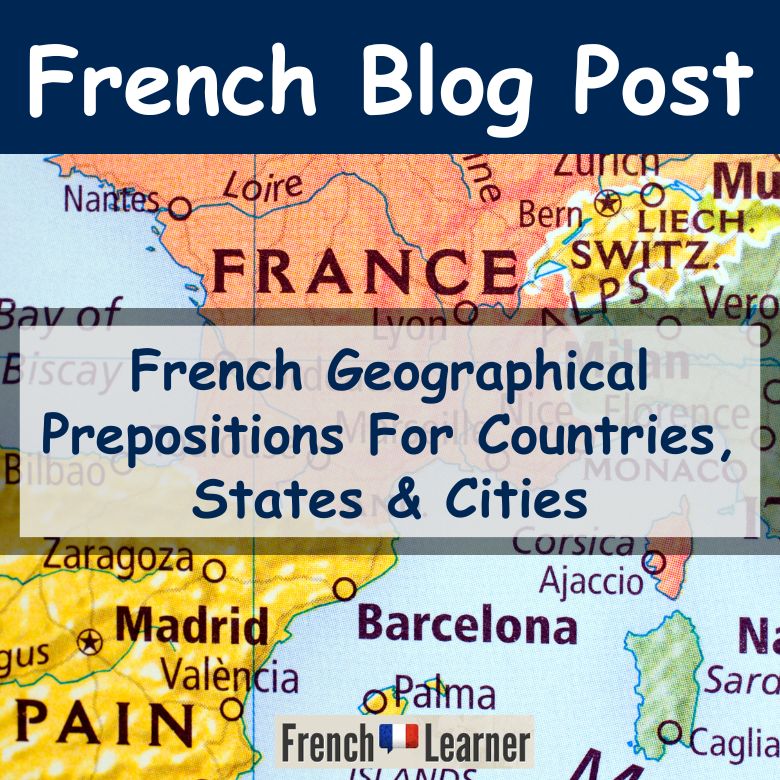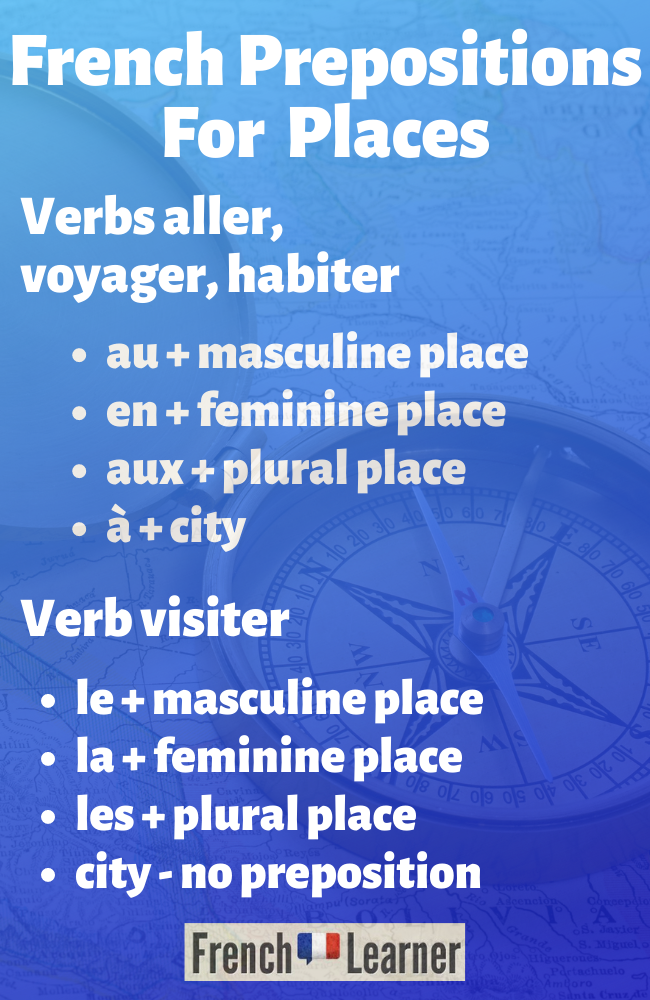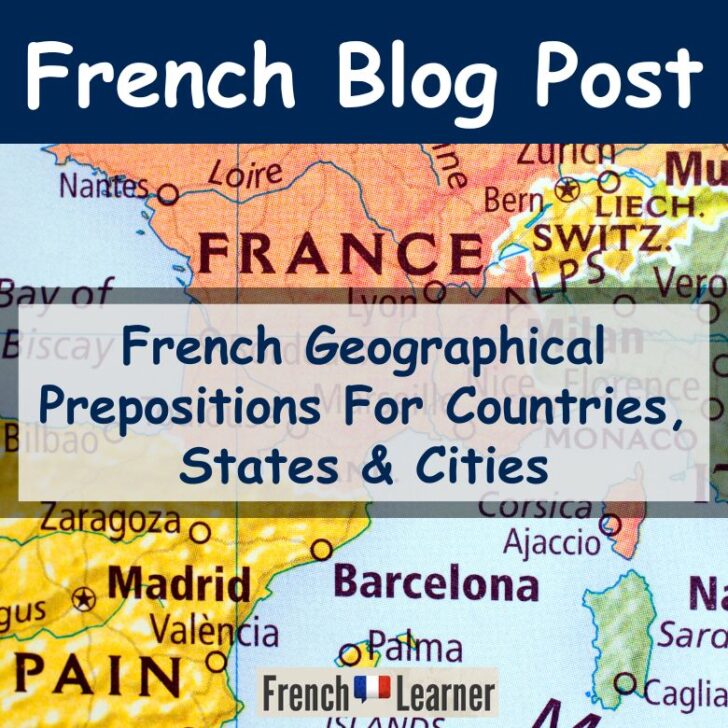In French, geographical prepositions for countries, cities, states and provinces can be difficult. In a nutshell, the rule for prepositions for places is to use au for masculine countries (provinces and states), en for feminine countries, aux for plural countries and à for cities.

French Geographical Prepositions
Geographical prepositions for countries, states and provinces
Verbs Aller, Voyager, Habiter
In this first section, we’ll look at the prepositions associated with the verbs aller (to go), voyager (to travel) and habiter (to live), as we often talk about where we go, travel and live.
For these three verbs, the rule for geographical prepositions is as follows:
- au + masculine country, state or province
- en + feminine country, state or province
- aux + plural country, state or province
- en + masculine country, state or province
Before we go any further, let’s take a very quick look at “au”. “Au” is a combination (or contraction of) the preposition “à“ (to/at) and the definite article “le“ (the).

Country prepositions
All countries in French have a gender (masculine or feminine) or number and are preceded with a definite article. Some have no gender but are plural. For example:
- la France France
- le Canada Canada
- les États-Unis the United States
A rule of thumb is that almost all feminine countries end in the letter -e, with the exception of “le Mexique” (Mexico).
Thus, here are some example sentences using our three selected verbs aller, voyager and habiter.
- Je vais/voyage/habite en France. I go/travel/live (to or in) France.
- Je vais/voyage/habite au Canada. I go/travel/live (to or in) Canada.
- Je vais/voyage/habite aux Etats-Unis. I go/travel/live (to or in) the United States.
Iran, for example, is a masculine country that starts with a vowel. Hence:
- Je vais/voyage/habite en Iran. I go/travel/live (to or in) Iran.
State prepositions
For states in the in the United States, the same preposition rules to countries (see above) applies. In general, states ending in “a” (such as Florida; la Floride) and “ia” (such as California; la Californie) are feminine. States ending in consonants (le New York, le Texas) are masculine. Hence:
- Je vais/voyage/habite en Californie. I go/travel/live (to or in) California.
- Je vais/voyage/habite au Texas. I go/travel/live (to or in) Texas.
Masculine states starting with a vowel take the preposition “en”.
- Je vais/voyage/habite en Alaska. I go/travel/live (to or in) Alaska.
Some masculine states can take the preposition “dans le”. For example:
- Je vais/voyage/habite dans le Maine. I go/travel/live (to or in) Maine.
Regions and departments of France
These same preposition rules also apply to both regions and departments in France. Hence:
- Je vais/voyage/habite en Bretagne. I go/travel/live (to or in) Brittany.
- Je vais/voyage/habite au Pays de la Loire. I go/travel/live (to or in) Loire Region.
Some masculine region in France can take the preposition “dans le”. For example:
- Je vais/voyage/habite dans le Nord. I go/travel/live (to or in) the North.
Canadian province prepositions
The same rules apply to the Canadian provinces. The two most populated provinces are masculine: “l’Ontario” and “le Québéc”. British Colombia is feminine: “la Colombie Britanique”. Hence:
- Je vais/voyage/habite en Colombie Britanique. I go/travel/live (to or in) British Colombia.
- Je vais/voyage/habite au Quebec. I go/travel/live (to or in) Quebec.
- Je vais/voyage/habite en Ontario. I go/travel/live (to or in) Ontario.
This page offers a map of the Canadian provinces with their respective genders:
- l’Ontario (m) Ontario
- le Québéc Quebec
- la Colombie Britanique British Colombia
- l’Alberta (m) Alberta
- la Saskatchewan Saskatchewan
- le Manitoba Manitoba
- l’île du Prince Édouard Prince Edward Island
- le Nouveau-Brunswick New Brunswick
- la Nouvelle-Écosse Nova Scotia
- la Terre-Neuve-et-Labrador Newfoundland and Labrador
- le Yukon Yukon Territory
- les Territoires du Nord Ouest Northwest Territory
- le Nunavut Nunavut
Island countries and states
In French, both island countries and states take the preposition “à” when using “aller”, “voyager” and “habiter”. Hence:
- Je vais/voyage/habite à Cuba. I go/travel/live (to or in) Cuba.
- Je vais/voyage/habite à Hawaï. I go/travel/live (to or in) Hawaii.
Verb “visiter”
When using the verb visiter (to visit), the preposition rule for countries, states and provinces changes. For visiter, no preposition is required and the regions are preceded by their definite articles, “le”, “la” and “les”, depending on their genders. Hence:
- Je visite la France. I visit France.
- Je visite le Canada. I visit Canda.
- Je visite les États-Unis. I visit the United United States.
When talking about islands and using the verb visiter, no preposition is required.
- Je visite Cuba. I visit Cuba.
- Je visite Hawaï. I visit Hawaii.
Prepositions for cities
For the verbs aller, voyager and habiter, cities require the preposition “à”. Hence:
- Je vais/voyage/habite à Paris. I go/travel/live (to or in) Paris.
- Je vais/voyage/habite à Londres. I go/travel/live (to or in) London.
- Je vais/voyage/habite à New York. I go/travel/live (to or in) New York.
The cities of New Orleans and Cairo take a definite article. Hence, la Nouvelle-Orléans and Le Caire. Hence:
- Je vais/voyage/habite à la Orléans-Orléans. I go/travel/live (to or in) New Orleans.
- Je vais/voyage/habite au Caire. I go/travel/live (to or in) Cairo.
Quebec City, Washington DC and New York are interesting cases as they share their names the states/provinces. Hence:
- Je vais/voyage/habite à Québéc. I go/travel/live (to or in) Quebec city
- Je vais/voyage/habite au Québéc. I go/travel/live (to or in) Quebec Province
- Je vais/voyage/habite à Washington. I go/travel/live (to or in) Washington DC.
- Je vais/voyage/habite au Washington. I go/travel/live (to or in) Washington (state).
- Je vais/voyage/habite à New York. I go/travel/live (to or in) New York.
- Je vais/voyage/habite au Québéc. I go/travel/live (to or in) New York (state).
When using the verb “visiter” with cities, no preposition is required. Hence:
- Je visite Paris. I visit Paris.
- Je visite Londres. I visit London.
- Je visite New York. I visit New York City.
Exceptions are New Orleans and Cairo:
- Je visite la Nouvelle-Orléans. I visit New Orleans.
- Le visite Le Caire. I visit Cario.

